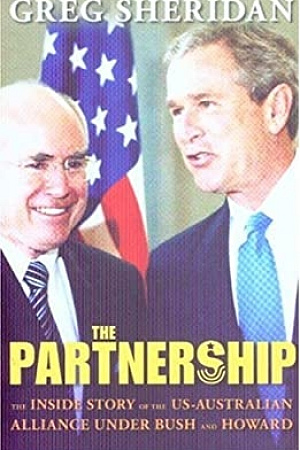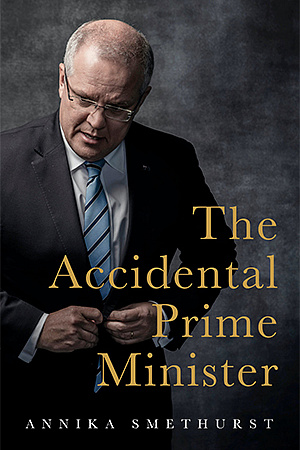Plagued: Australia’s two years of hell – the inside story
Pantera Press, $34.99 pb, 360 pp
Too close for comfort
Scott Morrison needn’t waste time writing a political memoir: the work of self-vindication has already been attempted on his behalf by Simon Benson and Geoff Chambers, both columnists at The Australian, in their now highly controversial book Plagued: Australia’s two years of hell – the inside story. Theirs is a largely heroic story about Morrison’s leadership, which ‘served the nation well’ amid a ‘most extreme period of adversity’.
The general outline and subject of this book are not without merit. Benson and Chambers have retraced the unfolding pandemic (particularly 2020) in great detail, and they have located Australia’s changing relationship with China at the centre of that story. They convincingly show that the ‘Australia–China dynamic was a backdrop to many if not most of Morrison’s conversations’ with world leaders throughout the pandemic.
There is some value in seeing parts of the pandemic from the window of the prime minister’s office. The early chapters offer an engaging account of the incipient crisis, compounded by the death of Morrison’s father in January 2020. Later, the breakthrough of the virus into the aged care sector is covered compellingly. The authors avoid dwelling on the details of specific lockdowns, but the latter still evoke painfully fresh memories for some. By way of contrast, the second year of the pandemic is essentially relegated to the last eighty pages, leaving little room for cautious analysis or reflection.
Perspective, though, is this book’s most significant limitation, as Matthew Ricketson has noted in The Conversation. Plagued is the gospel according to Morrison, chief of staff John Kunkel, Chief Medical Officer Brendan Murphy, and Health Minister Greg Hunt – the self-styled ‘Covid Brains Trust’ on whose WhatsApp messages and phone calls our lives hinged. Medical advisers, state premiers, and fellow world leaders abound, but there is scarcely a Cabinet minister in sight, aside from Hunt, Treasurer Josh Frydenberg, and Morrison (a Cabinet in his own right). Benson and Chambers legitimately allow Morrison’s account to be heard, but at times his testimony fills entire pages without any authorial intervention. That is as much bad journalism as it is bad history.
This is a story of predictable enemies, too. The flat-footed federal medical bureaucrats who needed to be dragged by the Commonwealth to issue medical advice; the NSW Teachers Federation, which selfishly thwarted the government’s plan to keep schools open; the ‘hawkish’ Brett Sutton; and the entire Victorian public health system, on whom the worst missteps are pinned. The ‘Queensland regime’ under Premier Annastacia Palaszczuk was particularly villainous at the border (Western Australian Premier Mark McGowan gets off lightly). The big surprise is that Benson and Chambers treat Victorian Premier Daniel Andrews quite favourably. Whatever its shortcomings, this book bears none of the ideological zealotry and rancidness that stained the front pages of the Herald Sun through the pandemic.
Still, proximity with the subject leads too often to historical protection. Morrison’s misguided ‘snapback’ notion in the early phase of the crisis, lampooned as it was, is absent; Kevin Rudd’s critical intervention with Pfizer in mid-2021 is nowhere to be found; and the mishandling of the Brittany Higgins rape allegation and of the allegations concerning Attorney-General Christian Porter are relegated to two pages. Supply chain troubles, European obstructionism, and the University of Queensland’s failure to get a local vaccine through clinical trials were the only real roadblocks on an otherwise well-considered path to national vaccination.
Then there is the inconvenient matter of history. Morrison’s claims to global leadership against Chinese aggression are dramatised with simplistic references to appeasement and the 1930s. The first chapter of the book, which briefly examines the 1919 influenza pandemic in Australia, is comprised of equal parts archival material, scholarly narrative, and journalistic cliché. Midway through the book, Morrison (apparently a ‘reader of history’) likens himself to Joseph Lyons, who faced the Great Depression with ‘strong empathy’ and ‘disciplined economic principles’ in equal measure. The dearth of sources and the deluge of typographical errors suggest carelessness. Also, Lyons required no empathy consultants.
None of this was what helped this book make headlines. In just one page, we learn that Morrison secretly swore himself in as health minister and finance minister alongside Hunt and Matthias Cormann respectively, without the latter’s knowledge. Between 12 and 14 August, this revelation appeared in News Corporation headlines, followed by the extract itself in the Weekend Australian. By 16 August, the controversy had drawn comment from Prime Minister Anthony Albanese, his successor, and threatened to ensnare the office of the governor-general. Another, more humanising morsel from the book appeared online that day, revealing that Morrison had used a ‘mild sedative’ during the pandemic, but by then nobody was terribly interested in this.
Political books in Australia have often been time bombs manufactured within the walls of mainstream media companies. In the late 1960s and early 1970s, press gallery doyen Alan Reid published two famous books about leadership ructions inside the Liberal Party. The Power Struggle (1969) and The Gorton Experiment (1971) were both designed to be political explosives, igniting further crises within the government when detonated. As Bridget Griffen-Foley explained in Party Games (2003), Reid was a journalist on Frank Packer’s payroll, and these books were conveniently published through Packer’s own publishing house: Shakespeare Head Press.
For media proprietors, a journalist with a book is a very convenient thing. Economically, it allows for cosy cross-promotional deals among different wings of the media empire. Politically, it means that media companies have a clear role in shaping the first draft of history (in the form of daily columns and headlines) and the second draft as well (in the form of their journalists’ published books). Paul Kelly, a prolific journalist and author, has consistently paid dividends for the Murdoch Press in this regard. In news media terms, a controversial book allows companies to effectively generate their own headlines.
The whole system of book production and corporate cross-promotion is illuminated when it goes wrong. In 2002, former Democrats leader and Labor shadow minister Cheryl Kernot published Speaking for Myself Again with HarperCollins. News Corporation papers obtained exclusive serialisation rights and were horrified when their sister company accidentally violated those rights by publishing Kernot’s first chapter online for competitors to see. The book quickly began making headlines for other reasons, but the incident illuminated the commercial system of political book production.
Benson and Chambers have earned themselves a unique place in this history of explosive and cross-promotional publishing. Plagued is a product of Pantera Press, a social enterprise whose mission is apparently defined by ‘Good Books Doing Good Things™’. It is not clear why such a publisher produced such a book, and there are no Acknowledgments or Author’s Notes in the book to shed light on this (merely a disclaimer in the event of ‘errors or omissions’, professing to have ‘published in good faith’).
The authors’ exclusive scoop will now see them called before Justice Virginia Bell’s inquiry. Unlike Reid or Kelly, whose books usually landed their punches or cast shadows over their competitors, Benson and Chambers have scored what Ricketson calls an ‘eye-watering own goal’. Their story about Morrison’s ‘unquestionable success’ has instead become, in the words of Stephen Donaghue, the federal solicitor-general, a story of sound governance ‘fundamentally undermined’. And given that the book lacked the full story, it was made redundant almost overnight.










Leave a comment
If you are an ABR subscriber, you will need to sign in to post a comment.
If you have forgotten your sign in details, or if you receive an error message when trying to submit your comment, please email your comment (and the name of the article to which it relates) to ABR Comments. We will review your comment and, subject to approval, we will post it under your name.
Please note that all comments must be approved by ABR and comply with our Terms & Conditions.